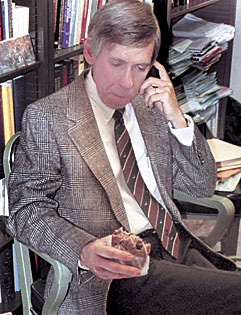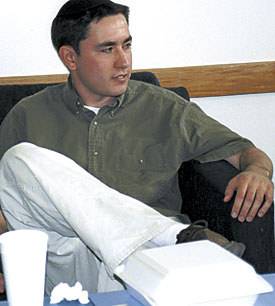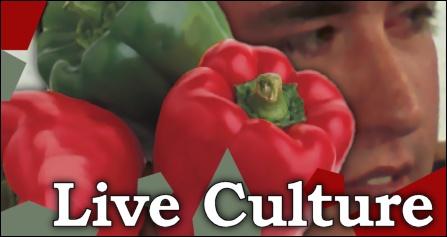 |
|
ALYSON E. GROVE/Arizona Daily Wildcat
|
Professor Jim Todd relaxes in his office during office hours while eating a vegan sandwich. He eats no meat or dairy, but he does eat fish.
|
|
By Biz Bledsoe
Arizona Daily Wildcat
Tuesday February 11, 2003
Meat is out the window as veganism and vegetarianism become increasingly popular
Mahatma Gandhi, an icon of the non-violent peace movement, was quoted as saying, "Be the change you wish to see in the world." In an effort to make improvements, whether in the world or simply within themselves, many UA students and faculty have adopted Gandhi's attitude when contemplating their eating habits. The challenge lies in taking on eating habits that correspond to their personal, ethical or religious beliefs, and for these students, making a difference means becoming vegan, vegetarian, or keeping kosher.
Though many people may not consider drastically changing what and how they eat to be a vehicle for great religious, political, ethical, or personal change, the everyday decision of what to eat carries more consequences than simply, "How many more calories will I have to burn after this double bacon cheeseburger?"
The consumption of animal products can lead to an ethical dilemma most people have thought about but never acted upon: Is it morally and ethically right to eat living creatures? There are countless arguments for the majority of people in the "yes" category. Most people come to the conclusion that as humans, we are at the top of the food chain and can therefore kill and eat whatever we want because it is in our power to do so. Or we comfort ourselves with thoughts of cows and pigs as destined to become hamburgers and bacon because of their status as less- than-intelligent and soulless. Yet another justification is that it would be too difficult to change our eating habits given the flood of animal products in every restaurant, grocery store and concession stand. We ask, "What is there left to eat if not animal products?"
But at UA there is a significant group of students and faculty who have decided to join the "no" category. Laine Buchanan, a sophomore majoring in Spanish, knows all the arguments for eating animal products, and the obstacles that come with combating them in defense of her vegan lifestyle, which prohibits the consumption of all products that come from animals, including meat, dairy, eggs, honey, gelatin (which contains cow bone marrow), whey, silk, wool, and leather.
In fact, Buchanan herself was once a member of the animal-eating population, fighting the beliefs of a vegan friend.
"I argued with him. I gave all the arguments that people who don't know anything about (veganism) usually give," Buchanan said. "And then I decided to do research about it, and what I found horrified me so much that from that day on I swore I would have nothing ever to do with animal products."
 |
|
ALYSON E. GROVE/Arizona Daily Wildcat
|
Judaic studies and philosophy sophomore Rob Glazer sits in the lounge at the UA Hillel, after eating a kosher meal at the Oy Vey CafŽ.
|
|
Research into the conditions under which almost all product-yielding animals are kept yields shocking results, as depicted in the well-known book "Animal Liberation" by Peter Singer. Contrary to what many might think, it's not just the animals killed for meat that suffer through strange and painful conditions. An example of this can be seen in the treatment of egg-producing chickens, which are kept in cages with wire floors. The chickens' claws become so long that they grow around the wires, rooting them to the spot. As a result, chicken farmers often cut off the chickens' feet, as well as their beaks to keep them from pecking each other through their cages.
This example of the treatment of egg-laying chickens, which aren't killed for poultry meat, has led many people to switch from vegetarianism, in which only meat is avoided, to full veganism.
The popularity of many books that document the poor livestock conditions in America, such as "Diet for a New America" by John Robbins, Singer's "Animal Liberation," and "Fast Food Nation: The Dark Side of the All-American Meal" by Eric Schlosser, points to a growing number of vegetarians and vegans. It's literature like this that causes people, like Buchanan, to make major changes and sacrifices in their lives.
Always an animal lover, Buchanan had no idea of what went into the making of that chicken sandwich or that slice of pizza everyone eats without a thought.
"I'd always considered myself an animal lover, but after becoming vegan I realized that no one who's an animal lover eats meat or dairy products," she said.
"I think I had the same idea that 99 percent of Americans have, the sugar-coated idea that our cows are kept in open pastures, and that animals are brought up on farms, when that's truly not the case at all," Buchanan said. "They're kept in horrific conditions where they die of maltreatment and disease, where they're not even allowed to be animals at all. They're basically tortured to death."
And you don't even have to be an animal lover to be swept away in the burgeoning tide of veganism. Many believe the large amounts of livestock kept in America are an environmental hazard as well as an animal-rights violation. And it's not just cow gas, either. A common vegetarian argument claims that the huge amounts of land used to keep and graze livestock is severely limiting the world's food production capacity, damaging the soil and contributing to global warming. So, even those who think chickens and cows are fair game to eat but still care about world hunger or the environment often find themselves drawn to vegetarianism.
The notion that vegans and vegetarians are unaccepting of people who eat meat and animal products is usually unfounded. In fact, there are even variations and disagreements among vegetarians as to what is acceptable to eat and what constitutes an animal product.
UA political science professor and vegan Jim Todd is an example of the diversity of eating habits present in the vegan world. Because he eats fish, Todd is not a true vegan, but rather a pescetarian. He also uses some animal products, like leather, and supports the use of some animals in some research. For Todd, as with many vegans, any effort to ease animal and environmental problems is a great one.
"I think anything that anybody does to help lessen the suffering of animals or to lessen the hunger in the world is great," Todd said. "I think when we make a choice to eat meat, most of us have no idea that that choice has implications for the world."
Those implications were documented in Robbins' "Diet For a New America," given to Todd by a vegan student about seven years ago when Todd was on the brink of veganism.
"All you need to do is read that book and you'll never want to eat meat again," Todd said. "It talks about all the health problems, and the way in which animals are treated and slaughtered, and the impact on world hunger (eating meat) has."
Todd's initial choice to become vegan was more of an effort to stay healthy than it was to change the world.
"I'd been moving toward vegetarianism without even realizing it. There's a lot of heart trouble in my family and I was having blood pressure problems, so I was cutting out meat," he said. "It's a combination (of moral and health choices). Originally it was for health, but the more I thought about it, especially with the issue of the future of the world, I thought, ÎI don't want any part of contributing to this ongoing problem.'"
There are risks and obstacles to changing your eating habits, which run the gamut from alienating your non-vegetarian friends and family to battling the hippie/weirdo stereotype to making sure you replace vitamin B12, the only vitamin not consumed in a vegetarian lifestyle. And there are the less important, but still challenging, sacrifices, such as giving up your favorite restaurants and all fast food, the longer trip to Wild Oats or Trader Joe's instead of to your local grocer, and the expense of buying all that tofu and vegetables. Not to mention the cravings.
"I don't have a single friend who's even vegetarian," Buchanan said. "But my friends are very understanding and very accommodating to me. Even the people who don't understand or agree with what I do, the majority can respect my willpower and respect the fact that I'm doing something that I believe in."
Personal beliefs are an important factor in a person's eating habits. Vegans and vegetarians aren't the only ones who make major sacrifices in order to serve a higher purpose. Take Rob Glazer, a Judaic studies and philosophy sophomore. He keeps kosher, which is an ancient Jewish practice that is based in the Torah, the foundation of Jewish law.
Kosher-keeping Jews refrain from eating dairy and meat in the same meal. All their cooking and eating utensils are designated as for either dairy use or meat use, and must be kept separate. In addition, animals that are eaten must be slaughtered in a humane and painless way, and some animals, such as pigs, are prohibited from being eaten. Like veganism, keeping kosher requires constant monitoring of what goes into your body. For students like Glazer, eating at the Student Union Memorial Center, or at any restaurant, is out of the question. He can only eat out at two restaurants in Tucson, the Oy Vey CafŽ at the Hillel Center on campus, and at the Jewish Community Center. This sacrifice might seem like a lot of trouble for such a daily routine as eating, but Glazer knows the benefits of his commitment.
"It's a way of turning a simple act into something holy," Glazer said. "I don't think (my life is more difficult), but it's definitely a different experience than most people on campus have. Most people get hungry and they eat. When I get hungry, I have to think."
An Orthodox Jew, Glazer abides by the strictest form of the kosher law, though less strict forms of keeping kosher are practiced. Some may eat out but abstain from meat, or others will eat non-kosher meat but not with dairy. For Glazer, the spiritual and personal benefits of keeping kosher far outweigh the temptation to eat a cheeseburger.
"In Judaism, the only purpose of eating is to get energy to live life to serve God, and really just make this world better, so (keeping kosher) takes away from your desire for food. So I'm never really tempted."
Like Todd, Glazer doesn't resent those who don't keep as strict a diet as he does. It all comes down to good intentions.
"I think (any form of keeping kosher) is a wonderful thing. Any effort is a wonderful thing."


